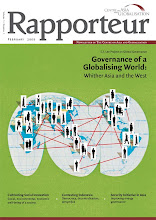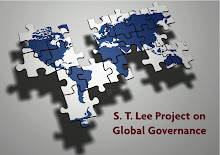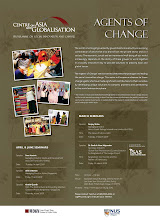 Significant global trends are combining to make transparency and disclosure regulation one of the most important and exciting areas in which government and civil society can be working to transform and strengthen local governance structures.
Significant global trends are combining to make transparency and disclosure regulation one of the most important and exciting areas in which government and civil society can be working to transform and strengthen local governance structures. Not only are advances in electronic and digital communications enabling people to access information that governments may not want publicized; ideas and norms have fundamentally shifted. It is increasingly expected across societies that “good” governments are transparent and open, and practitioners are also actively recognising that transparency can be a useful regulatory tool to improve performance across a range of governance sectors, from economic issues to environmental, health, and corruption concerns.
From March 4-6, 2009, The Asia Foundation and the Centre on Asia and Globalisation (CAG) of the Lee Kuan Yew School of Public Policy in Singapore jointly hosted an International Workshop on Transparency and Access to Information. The event brought together academics, civil society members, and government officials from China, Vietnam, India, Korea, Mexico, Singapore, and the United States, to discuss ongoing innovations and challenges in the use of transparency regulation in strengthening local governance.
The workshop afforded opportunity for remarkably open discussion on the approaches and obstacles for transparency regulations that spanned the whole policy-making process. For example, at the policy drafting stage, the Vietnam National Assembly has agreed to include an Access to Information law into the 2009 legislative agenda and assigned the Ministry of Justice to head the drafting committee, with the expectation for the law to be promulgated in 2010. At the implementation stage, China’s Open Government Information (OGI) regulation came into force on May 1, 2008, and efforts are ongoing to implement the regulation at the local level. And on the enforcement and sustainability question, countries such as Korea and Mexico have had access to information laws in place for over a decade, placing them in a position of being able to share plentiful lessons in implementation and efforts at improvement over time.
The diversity of country experiences gathered in Singapore made for some intense discussion on the wide-ranging approaches to enacting transparency regulations. For example, India’s remarkable transparency law was the result of a sustained and extremely widespread campaign carried out by a vast network of civil society groups across the country. China’s OGI regulation, in contrast, evolved from a combination of sustained experiments by local governments, on the one hand, and central level legislative commitment on the other.
The workshop saw participants engaging in lively discussion on the various roles of government, civil society, and academia in advancing the use and understanding of transparency as a governance tool. Some emphasized that civil society demand for information is crucial to the successful practice and implementation of access to information laws and regulations, and underscored the need for civil society to be constantly vigilant and to act as a check against the government. Others placed greater store on the need to have stronger government leadership and political will to drive reform and overcome the myriad of vested interests within the system, to create an effective system of disclosure, and transform the mindsets of public officials. Still other participants commented that it would be important to debunk some of the common myths and misconceptions leading to fears about the potentially destabilizing effects of government openness. Academia plays an important role in this process, in building up research projects that rigorously investigate the relationship between transparency regulations, and governing performance.
Participants also tackled the relationship between transparency regulations and democracy. It was pointed out that in Mexico, a gradual and steady process of democratization led to transparency being viewed as an important component of the democratic system. Some argued that transparency can only flourish in a culture where the principle of transparency is tightly coupled with the democratic notion of access to information as an individual right.
On the other hand, it was also argued that transparency regulations can work across a wide range of political environments. For example, in Vietnam a surprisingly vibrant media and the growing importance of public opinion in the country’s political, economic, and social life are energizing the call for greater transparency and access to information. One presenter suggested a few broad guiding principles for the enactment of successful transparency laws: First, the laws should be compatible with the existing political environment; second, the law has to benefit public officials as well as the people, so that there are proper incentives for successful implementation; and third, implementation efforts should involve participation from civil society and the media.
The workshop saw substantive discussion on the challenges of implementation. It was noted that there are several challenges lying ahead for the implementation of the OGI regulation in China. Particular attention was given to the initial efforts being done by the Legislative Affairs Office of Hunan Province, with technical support from The Asia Foundation.
In general, participants noted a wide range of challenges on the implementation front. First, challenges can arise from a culture of secrecy within the government and bureaucracy, and a lack of political will and commitment. Second is the challenge of having adequate resources, building the proper systems and procedures for archiving, record-keeping and disclosure, and training for public servants. Third is to establish consistency between new disclosure regulations and existing laws, particularly secrecy laws. Fourth, it is critical to generate sufficient awareness within the government bureaucracy and publicly across business and society. Without outside pressure and demand for information, the government faces little incentive to implement disclosure systems properly.
Moving forward, workshop participants raised a wide-ranging set of research and programmatic agendas for potential future collaboration. There was an enthusiastic reception to the idea of forming global networks between academic institutions, civil society organizations, and governments to promote long-term sharing of knowledge and learning in transparency that can help create awareness and build norms across sectors.
Participants were also keenly interested in the development of indicators for assessing the performance of transparency initiatives. It is clear that the issue of transparency and governance is a topic of great relevance to Asia’s development. As countries from India to Vietnam to China continue to experiment with different approaches to transparency, it is likely that we will be witnessing significant innovations coming from the region. [Yeling]
Yeling Tan is The Asia Foundation’s Consultant in Singapore. She can be reached at ytan@asiafound.org.










No comments:
Post a Comment